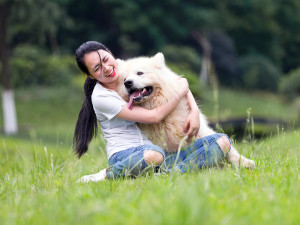Turns Out Your Pet Might Be Your Best Anti-Ageing Secret
As if we needed any more reasons to love them...

Share Article
Can walking the dog really sharpen your memory? Or could curling up with a cat actually help you hold onto your words? An 18-year studyopens in new tab of 16,000 adults across Europe found that dog and cat parents experienced slower cognitive decline than people without pets in their lives.
It’s a reminder that our animal friends may be more than just loyal companions – they could also be quiet guardians of our long-term brain health (as if we didn’t love them enough already). From the structure of daily routines to the boost of physical activity, and from the comfort of emotional bonding to the relief of stress, pets seem to play a surprisingly powerful role in building what scientists call “cognitive reserve”: the brain’s ability to adapt, protect itself and stay resilient as we age.
Dogs, memory and daily routines
The results of the study varied depending on the animal by your side. Dog parents, for instance, were found to hold on to a sharper memory, which is a reassuring thought in a world where dementia and Alzheimer’s are on the riseopens in new tab.
“Routine activities like dog-walking may be the reason”, says consultant neurologist Dr Steve Allderopens in new tab. “Repetition reinforces memory pathways while walking stimulates brain-derived neurotrophic factor (BDNF), which supports hippocampal health and memory consolidation.”
Of course, it doesn’t always feel like a health boost when your pup is barking at 7am on a Saturday. But those early wake-ups and daily feeding times are quietly doing double duty – keeping your dog happy while also keeping your own brain sharper.
Cats and language retention
Cats, meanwhile, showed their own surprising benefit. The study linked having a cat in your life with a slower decline in verbal fluency and delayed recall. This doesn’t mean cats are teaching us new vocabulary (though if you’ve started meowing, no judgement here). But it does suggest cat parents hold onto their words longer.
“People often talk to their cats, narrating daily activities or using pet-directed speech,” says Dr Allder. “This low-pressure, repetitive language use helps reinforce pathways that support speech and word recall.”
So, keep talking to your cats and don’t let anyone tell you otherwise!
Emotional connection as a mental buffer
We often think ageing well comes down to medicine and blood tests, but the mind and body are deeply connected, and one of the biggest threats to the brain is chronic stress.
“Social bonding, whether with humans or pets, has profound effects on brain plasticity and resilience to decline,” explains Dr Allder. “Bonding experiences trigger the release of oxytocin (the ‘love hormone’), which reduces stress reactivity in the brain while supporting hippocampal function and even promoting the growth of new neurons. Over time, these positive interactions build cognitive reserve, a kind of buffer that helps the brain adapt to age-related changes or early signs of disease.”
Who knew that just hanging out with our pets (stroking them, walking them or simply sharing the sofa) could be giving our brains a boost?
Lying with a pet might boost your sleep
As you age, sleep can also become lighter and more fragmented, often disrupted by health conditions or shifting routines. Here, too, pets may play a role.
Sleep expert Dr Nerina Ramlakhanopens in new tab acknowledges there are downsides to sharing a bed with your pet (I could name a few), but she also highlights the positives. “Receiving unconditional love from a pet stimulates oxytocin, which soothes us and in turn enables us to produce melatonin (the sleep hormone),” she explains.
Lessons for millennials and Gen Z
While the study focused on adults aged 50 and older, its findings also carry lessons for younger generations. The benefits of pet parenting were not moderated by age, meaning both younger and older adults gained similar cognitive advantages.
That’s good news for millennials and Gen Z, many of whom are already enthusiastic pet parents. Building brain-healthy habits earlier in life, whether through daily walks, play or simply the responsibility of caring for an animal, could reward your brain in later life.
“The brain is highly adaptable in youth, so the choices made now can have a compounding effect on resilience later in life,” says brain and cognitive expert Natalie Mackenzieopens in new tab. In other words, caring for a pet isn’t just rewarding in the moment; it can help set the foundations for long-term brain health.
Everyday strategies for brain-boosting interaction
So how can we make the most of the brain benefits pets bring into our daily lives? Natalie shares some simple strategies:
Play with purpose
“Play activates the brain’s reward system, releasing dopamine, which boosts learning and motivation,” says Natalie. It also engages the prefrontal cortex (the part of the brain we use for planning and decision-making).Train for growth
Teaching your pet new tricks (or reinforcing old ones) strengthens attention, patience and flexibility. “Training also reinforces a growth mindset,” Natalie explains. “As you learn to overcome challenges and celebrate small wins.”Make it accessible
You don’t need long walks to reap the benefits. “Even being in the presence of animals is beneficial,” says Natalie. Stroking, grooming or simply sitting quietly with a pet releases oxytocin, the bonding hormone that lowers stress and protects memory centres in the brain. Talking to your pet, using hand signals or responding to their cues also stimulates brain regions involved in language, memory and emotional processing.
Correlation or causation?
Sceptics may wonder if pets really protect our brains, or if healthier people are simply more likely to own them. In truth, it’s probably a mix of both. “Healthier people may naturally be drawn to pet parenting because they already have good routines, but for others, a pet can be the spark that leads to change,” explains Natalie. “A previously sedentary person might start walking daily because of their dog, or someone struggling with loneliness might feel more connected and motivated to engage socially because of their pet.”
While pets aren’t a cure-all for ageing, the evidence suggests they can be powerful allies. Dogs appear to protect memory, cats support language skills, and both provide emotional buffers that help us age more gracefully.
So the next time your dog drags you outside or your cat curls up beside you, remember: you’re not just caring for them, you’re investing in your future brain health.
Resources
Rostekova, A., Lampraki, C., Maurer, J., Meier, C., Wieczorek, M. and Ihle, A. (2025). Longitudinal relationships between pet ownership and cognitive functioning in later adulthood across pet types and individuals’ agesopens in new tab. Scientific Reports, [online] 15(1).
Alzheimer's Disease International (2020). Dementia statisticsopens in new tab. [online] Alzheimer’s Disease International.

Nuala McHugh
Nuala is a writeropens in new tab with a background in PR. She has worked with brands including Jollyes, Universal Studios, and Amazon. Based in Northern Ireland, she is now doing what she loves most: writing with her clingy cockapoo Bobby by her side.
Related articles
![Woman and her large white dog sit in grass outside.]()
Playing with Dogs Reduces Stress and Increases Concentration, New Study Finds
Having trouble chilling out or focusing? Maybe it’s time to get a dog
![Curly haired woman with tattoos holding her Labradoodle dog up to her face in a tender embrace]()
How Deep Is the Love For Our Dogs?
The connection between people and dogs is the stuff of legends
![Woman lying in bed with two golden retrievers]()
13 Reasons to Sleep In a Bed With Your Dog
It’s science (and adorable)
![beagle dog chilling with eyes closed]()
How Your Pet Can Help You Be More Mindful
And breathe...




